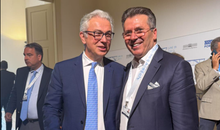
 Flash News
Flash News

In recent months, Serbia has engaged with the two main states of the European Union to reach strategic agreements.
Some experts have interpreted the willingness of Western countries to cooperate with Serbia as an example of efforts to lure it away from Russia's orbit.
But two American professors, familiar with developments between Kosovo and Serbia, Charles Kupchan and David Kanin, told the Voice of America that Serbia's recent agreements with the West, although they improve Serbia's position vis-à-vis Kosovo, should not be interpreted as its decision on the side of the West. Kupchan and Kanin spoke about the impasse in the dialogue process, the positions of the Prime Minister of Kosovo Albin Kurti and the President of Serbia Aleksandar Vučić and the impact that the elections of the United States may have on the region.
During a visit to Belgrade last month, German Chancellor Olaf Scholtz signed an agreement on the rare mineral lithium, vital for the production of electric cars. In April, during a visit to France, Serbian President Vucic asked to buy 12 fighter planes from France.
Some experts and world media have interpreted these increased commitments of the West towards Serbia as an example of efforts to lure Serbia away from Russia's orbit.
For experts on developments in Serbia and Kosovo, professors Charles Kupchan from Georgetown University and David Kanin from Johns Hopkins University, these agreements do not signal Serbia's alignment with the West.
"Serbia has been successful, but this should not be interpreted as a sign that Serbia has chosen the West. He did not choose the West. Vucic balances Russia, the European Union, the Americans, the Chinese and the Turks and everyone else he needs or wants to deal with and he does it very skillfully… He plays with the Russians, with the Americans. The Russians understand this, but the Americans don't. We behave as if he has chosen the West, while Russia does not come out with statements to say that Serbia has chosen the West", says Professor Kanin.
For Georgetown University professor, Kupchan, the latest agreements are a continuation of the policy that Vučić is pursuing with all countries despite the current geopolitical divisions, which have placed the West and the East on diametrically opposite axis.
"I do not see this as a turning point, nor a sign that Vucic is turning his back on his ties with Russia and China and that he is putting his feet in the West. Vucic is capable of engaging with both sides. He has reached agreements with Berlin and Paris recently. But I believe that he will do the same with Moscow and Beijing in the near future", he says.
Krahas këtyre marrëveshjeve me evropianët, Jared Kushner, dhëndëri i ish presidentit dhe kandidatit të tanishëm republikan për president Donald Trump, ka shprehur interes për një investim qindra miliona dollarësh në Beograd, për të kthyer në hotel ndërtesën e ministrisë së dikurshme të mbrojtjes, të bombarduar në vitin 1999 nga NATO.
Serbia, e cila gjatë viteve të fundit nën udhëheqjen e Presidentit Vuçiq ka rrëshqitur drejt autokracisë sipas organizatave të të drejtave të njeriut, ka ndjekur një politikë të marrëdhënieve më të afërta me Perëndimin ndërkohë që ka vazhduar lidhje të afërta me Rusinë dhe Kinën. Serbia është i vetmi shtet kandidat i BE-së që nuk ka vendosur sanksione ndaj Rusisë për agresionin ndaj Ukrainës. Por Beogradi i shet armatime ushtrisë ukrainase përmes palëve të treta.
Por dy ekspertët dallojnë në vlerësimet e tyre se çfarë ndikimi do të ketë ky qëndrim i Perëndimit ndaj Serbisë në dialogun me Kosovën.
“Serbia sërish është shndërruar në shtetin më të rëndësishëm në rajon, që ka marrëdhënie të mira me të gjithë. Kosova, në anën tjetër, udhëhiqet nga një kryeministër me të cilin duket se askush nuk dëshiron të punojë. Dhe kjo i jep avantazh Serbisë…. Para 25 vitesh, kur NATO-ja zhvillonte fushatën bombarduese, Serbia dukej si humbëse, e izoluar. Tani Serbia është gjithçka tjetër v eçs humbëse, nuk është aspak e izoluar dhe ka shënuar suksese të shumta në diplomacinë që po ndjek”, thotë Kanin.
Kanin, ish analist i agjencisë amerikane të zbulimit CIA për Ballkanin, thotë se këto suksese do t’i mundësojnë Vuçiq që të vazhdojë të këmbëngulë në krijimin e Asociacionit, i cili sipas tij është bërë një “obsesion” për diplomatët perëndimorë.
Kanin thotë se “vlerësimi që asociacioni do të integrojë serbët e Kosovës në institucionet e Kosovës është i gabuar” dhe se Serbia është në pozitë shumë të mirë që “me durim, por me këmbëngulje të bëjë trysni për të”.
“Kosova është para një situate shumë të vështirë, me një kryeministër që është jopopullor jashtë Kosovës, por që e ka të qartë që krijimi i asociacionit do të minojë sovranitetin e Kosovës”, shton ai.
Profesori Kupchan, analist i lartë pranë Këshillit për Marrëdhëniet me Jashtë, beson që Bashkimi Evropian do të vazhdojë të përqëndrohet në dialogun ndërmjet Kosovës dhe Serbisë, por nuk mendon që Serbia do të përfitojë nga vëmendja e shtuar e Perëndimit.
“Vëmendja e Perëndimit, nuk besoj se forcon peshën diplomatike të Serbisë. Mendoj që Bashkimi Evropian do të vazhdojë të nxisë dialogun midis Kosovës dhe Serbisë siç e sheh të domosdoshme. Përpjekjet e tyre janë të përqendruara në përmbylljen e këtij procesi. A do mund të kenë marrëdhëniet më të fuqishme ekonomike ndërmjet Francës, Gjermanisë dhe Serbisë ndikim pozitiv në marrëdhënien e përgjithshme? Po, sepse kontaktet më të shpeshta dhe lidhjet më të mëdha ekonomike janë më mirë se sa më pak, por gjithsesi nuk do t’i konsideroja këto marrëveshje si diçka që ndryshojnë rrjedhën,” thotë Kupchan.
Ai thotë se ndan shqetësimet se “procesi i dialogut ka hyrë në rrugë pa krye” dhe se për këtë dyja palët mbajnë përgjegjësi.
“Masat e Kurti, ndonëse mund të qëndrojnë në aspektin politik dhe ligjor, ishin të panevojshme në aspektin strategjik, sepse ishin provokuese pa nevojë. Për shembull, vendosja e kryetarëve të komunave në veri që u zgjodhën me një përqindje të papërfillshme votash; kjo u pasua me targat e makinave dhe më vonë me çështjen e dinarit,” thotë Kupchan.
“Të gjitha këto veprime justifikohen, sepse Kosova po përpiqet ta shtrijë sovranitetin e plotë të saj, por që nuk ishin të dobishme sa i përket marrëdhënieve me Serbinë. Beogradi nga ana e tij mobilizoi forcat përgjatë kufirit me Kosovën. Patëm një episod të dhunshëm në Banjskë dhe ai që pranoi fajësinë për këtë akt terrorizmi ende shëtit i lirë në Serbi. Patëm pastaj një letër të kryeministres serbe e cila shprehu rezerva për marrëveshjen, në të cilën thoshte se kurrë nuk do ta njohim Kosovën. Këto janë hapa prapa dhe për pasojë mund të themi se procesi i normalizimit ka ngecur,” shton ai.
Muajin e kaluar, qeveria amerikane njoftoi se emëroi diplomatin Alexander Kasanof si të dërguar të posaçëm për Ballkanin Perëndimor, pas përfundimit të mandatit të diplomatit Gabriel Escobar. Në fillim të vitit të ardhshëm, Bashkimi Evropian pritet ta emërojë një ndërmjetës të ri për të zëvendësuar diplomatin sllovak, Miroslav Lajçak.
Kupchan, i cili ka punuar në dy administrata amerikane atë Presidentit Clinton dhe të Presidentit Obama, si drejtor për Evropën në Këshillin për Sigurinë Kombëtare, pret që trysnia mbi Prishtinën dhe Beogradin të rikthehet pas një pauze për shkak të zgjedhjeve në Bashkimin Evropian dhe në Shtetet e Bashkuara dhe mbetet optimist për një epilog të këtij procesi.
“Mendoj se të luash me kartën e Rusisë, të Kinës, nuk është opsion në afat të gjatë për shkak të vendndodhjes gjeografike. Ballkani është pjesë e një hapësire më të madhe evropiane. Popujt e rajonit duhet të ndihen të bekuar, me fat. Ata që jetojnë në Azinë Qendrore, në Armeni, në Azerbajxhan, pra afër Rusisë, afër Kinës, jetojnë në një zonë të pasigurt në një të ardhme pa afat. Ballkani nuk është një zonë e tillë, është në Evropë dhe për pasojë mendoj se këtij procesi do t’i vijë një fund pozitiv,” thotë ai.
Por Kanin konsideron se dialogu është një proces që ka dështuar të japë rezultate dhe gjatë 30 viteve të fundit është peng i rotacionit të diplomatëve perëndimorë, që nuk kanë arritur ta çojnë procesin përpara. Sipas tij, nuk ka vullnet për të lëvizur dhe si i tillë dialogu që në fillim ishte i dështuar si proces.
“Serbët e dinë këtë gjë. Kosovarët e dinë gjithashtu. Vuçiqit ble kohë përmes avantazheve që ka siguruar përmes diplomacisë rajonale dhe kontakteve me udhëheqësit ndërkombëtarë, ndërkohë që Kurti ngul këmbë dhe provon të fitojë zgjedhjet e radhës dhe t’i mbajë larg serbët”, thotë ai.
According to Kanin, Washington and Brussels should reconsider their entire approach to the region and leave it up to the parties to reach agreements based on their preferences, even when the solutions may include plans like the one between former President Thaçi with President Vucic in 2018.
"We will not be able to impose a liberal, multi-ethnic, transparent and Western democracy in the region. We will not be able to impose peace and an end to conflicts. We have failed to do this over the past three decades. I think we should challenge the locals to find ways to work together,” says Kanin.
Even Kupchan is of the opinion that the conclusion of the conflict between Kosovo and Serbia will be in the hands of the leaders of both countries and their tendency to make difficult decisions.
"Playing the nationalism card is the easiest thing to do. But convincing the public that the time has come to put aside ethnic nationalism and look to the future is the bravest thing they can do. We're not at that point yet, but I think it's only a matter of time. These obstacles will be overcome when leaders are ready to take bold steps,” he adds.
Will the American elections have an impact on the unresolved issues between Kosovo and Serbia?
According to Kupchan, in this election cycle, the United States is very focused on the domestic plan, and foreign policy, dominated by Ukraine and the war in Gaza, will not be a priority, but nevertheless expects new energy in the dialogue process after elections in the USA and the consolidation of senior officials in the EU.
For Kan, the impact will depend on the winner of the election. According to him, President Trump has shown that he is unpredictable in his approach and that he changes his position, while, in his opinion, the expected Democratic candidate and current Vice President Kamala Harris, who he says does not know much about the Balkans, has very likely to continue the same policies towards the region, reports zeriamerica.
Latest news


What does Zelenskyy have more than Zegjineja?
2025-07-05 18:45:26

Fiscal peace, but at a cost
2025-07-05 18:00:10
'Bankers' tax evasion, Chinese CEO and former director jailed
2025-07-05 17:39:21
Kyle Walker joins English club on two-year deal
2025-07-05 17:20:24
Two cars collide on the Saranda-Delvina axis, 4 injured
2025-07-05 17:05:29
Touching gesture! Liverpool will pay Jota's family's salary until 2027
2025-07-05 16:45:18
The zodiac signs that cheat most often
2025-07-05 16:25:53

"I asked for the dismissals", Dredha tries to soften Rama's 'blow' in Vlora
2025-07-05 15:48:49
Bomb threat in Parliament, prosecutor: It was a lie
2025-07-05 15:22:28

Bardhi: The recount revealed how greedy Zeqine Balluku is in stealing
2025-07-05 14:44:29
Knife wound on the secondary road Tirana-Durrës, perpetrator sought
2025-07-05 14:37:54
Tears and pain, Diogo Jota is escorted to his final home
2025-07-05 14:21:34
Success starts with yourself! Simple ways to invest in personal development
2025-07-05 13:58:50
Unlicensed firearms found in apartment, 50-year-old arrested in Lushnje
2025-07-05 13:43:11

Tirana Court remands Skerdi Sina to prison
2025-07-05 12:59:34
Cocaine laboratory in Greece, here are the Albanians arrested and wanted
2025-07-05 12:40:16
Directed Justice/Vangjeli: SPAK does not investigate any scandal involving Rama
2025-07-05 12:22:03

Bomb alert, Police remove MPs and media from Kosovo Parliament building
2025-07-05 11:48:16
"The will of the people" and the irony of ordered resignations
2025-07-05 11:32:05
Summer drowning risk: How to enjoy the water without risking your life
2025-07-05 11:20:27
Fire situation in the country, 16 fires reported in 24 hours, 4 still active
2025-07-05 11:07:04
Car hits pedestrian at white lines, injured in serious condition in Vlora
2025-07-05 10:59:58
Mosquito-borne diseases are a growing problem in Europe
2025-07-05 10:44:13



One of Sweden's most dangerous and wanted criminals arrested in Turkey
2025-07-05 09:38:29
Foreign exchange/ How much foreign currencies are bought and sold today
2025-07-05 09:18:38

"Don't be influenced by the opinions of others", today's horoscope
2025-07-05 08:40:50

Morning Post/ In 2 lines: What mattered yesterday in Albania
2025-07-05 08:02:07

Trump says he's ready to raise tariffs to 70% on some countries
2025-07-04 22:35:52
Tre shenjat e zodiakut që do ‘pasurohen’ në Korrik
2025-07-04 22:05:09
Gaza War: Hamas Accepts US Proposal for 60-Day Ceasefire
2025-07-04 21:50:10
Autocracy in Albania, Fuga: Governance has gotten out of control
2025-07-04 21:40:51
Meta: Agriculture on credit, the new fraud!
2025-07-04 21:26:39




Vote recount in Durrës ends without changes
2025-07-04 20:12:54
Gas station explodes in Rome, 25 injured (VIDEO)
2025-07-04 20:00:20

These afternoon habits often sabotage weight loss
2025-07-04 19:39:28
Former Arsenal player Thomas Partey accused of rape
2025-07-04 19:24:21
Shepherd disappears without a trace in Delvina
2025-07-04 19:14:31

Bardho gave Zegjine's mandate/Braho: Unfair! It violates the electoral system
2025-07-04 19:01:08


Rapid developments in the Sultanates!
2025-07-04 18:00:06



Italy tightens rules for skateboard traffic
2025-07-04 17:20:18

Unusual for the time, dense fog covers the coast of Vlora
2025-07-04 16:48:01


Accident on the Shkodra-Lezhë axis, one dead and 3 injured
2025-07-04 16:14:19
Albania with fewer requests for asylum and Albanian citizenship in 2024
2025-07-04 16:06:57

Albania last for quality of life, DP: Technical government is the solution!
2025-07-04 15:42:30
Nico Williams says "No" to Barcelona, signs with Athletic Club until 2035
2025-07-04 15:33:35
Fires in the country, four fires are still active, what is the situation?
2025-07-04 15:24:20

Summer brings big changes for these 4 zodiac signs
2025-07-04 15:00:04
Osmani: MPs need to agree to a secret ballot for the Speaker of Parliament
2025-07-04 14:51:09
Serious accident on the Peqin-Elbasan axis, two injured
2025-07-04 14:37:56

GJKKO leaves in force the security measure for the head of the KPP
2025-07-04 13:58:17
Who will replace Ilir Meta and take over the leadership of the PL?
2025-07-04 13:50:36
Berisha: Dismissal of directors in Vlora, another act of 'scapegoats'
2025-07-04 13:41:46




Librazhd/ In a serious psychological state, the young man consumes pesticides
2025-07-04 13:05:07


Weapons trafficked from Kosovo to Albania, two arrested, 8 pistols seized
2025-07-04 12:33:28
Konsumimi i tepërt i çokollatës, ja cilat janë dëmet që shkakton në organizëm
2025-07-04 12:23:35

Fires in the country, 21 fires in the last 24 hours, 4 still active
2025-07-04 12:00:19
WB calls for debt transparency: Albania to publish details of every loan
2025-07-04 11:50:05
Changes in the State Police, new names expected to lead 5 police stations
2025-07-04 11:40:06

The race for the head of the BKH, the third phase on July 11
2025-07-04 11:20:23

Toxic phrases that show your relationship is in trouble
2025-07-04 11:00:10

